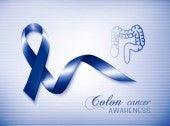March is National Colorectal Cancer Awareness Month.
So there will be a lot of “awareness” being trumpeted to the masses—mostly telling people to get their colonoscopies, watch for changes in bowel habits and basically hope your number doesn’t come up in the colorectal cancer lottery.
Well, I have a lot more to say than that.
Here’s what people should really be “aware” of:
Colorectal cancer—good news and bad
There’s good news and bad news about colorectal cancer.
First the good news:
According to the Centers for Disease Control and Prevention (CDC), rates of colorectal cancer (cancer of the colon and/or rectum) have been steadily declining about 3 percent per year since 2002 for both men and women, and death rates have dropped similarly.
Experts attribute much of this decline to colonoscopies and their ability to enable doctors to remove precancerous growths or polyps before they become cancerous.
Now for the bad news:
Colorectal cancer is STILL the third most common cancer among both men and women, and the third most common cause of cancer death in men and women.
Meaning we’re better at finding it, more efficient at removing it, but we’re still GETTING it!
What is cancer really?
I know you may find this unsettling, but chances are excellent that you have had "potential cancer" in your body several times over.
Cancer starts when the DNA in one of your cells gets damaged—from things such as pollutants, carcinogens in your food or the environment, poor nutrition, radiation or in some cases genetic mutation.
Usually, your immune system will detect these “cancer candidates” and destroy them.
But if the damaged cell is allowed to progress uninterrupted, it will begin to replicate itself way too fast until it forms a tumor.
How will I know?
Although the most common signs of colorectal cancer are changes in bowel habits (diarrhea, constipation or narrower stools than usual) or blood in the stool, here are some others you might not be aware of:
- Weakness or fatigue
- Cramping or gnawing abdominal pain
- Loss of appetite or nausea
- Unexplained weight loss
- Straining to have a bowel movement
Prevention is where it’s at!
Colorectal cancer happens to be one of the most preventable forms of cancer!
Here are some surefire ways to help reduce your risk:
Make half of your plate fresh fruits and vegetables, and eat a tossed salad every day.
I know I’ve said this countless times before, but studies still show that only 5 percent of the average American’s daily calories come from fruits and vegetables, and less than one person in four eats at least five servings a day—so go ahead and call me a broken record.
Avoid sugars and refined carbs.
Sugar literally feeds cancer cells, plus it is nourishment for harmful yeasts and microbes in your gut. When harmful microbes get the “upper hand” in your intestinal tract, this weakens your immune system function so it is less able to protect you against cancer.
Note that refined carbs (like breads, pasta, and pastries) turn to sugar upon digestion, so from your body’s perspective, there’s no difference.
And “sugars and refined carbs” also includes SODA, so stay far away from that liquid poison. And don’t you dare ask me if diet soda is any better.
Get enough vitamin D.
Vitamin D is especially protective against colorectal cancer, and for those people who are already suffering from it, it has been shown in studies to double your chances of survival! Optimum DK Formula with FruiteX-B can help ensure you have health-supporting levels of this crucial nutrient.
Pamper your colon and immune system with probiotics.
Probiotics help encourage more complete digestion and elimination of wastes, which is very important since constipation is a major colorectal cancer risk factor! Plus probiotics help support strong immune function, which protects you against cancer.
Super Shield multi-strain probiotic formula is as good as it gets. Super Shield is a full-spectrum formula that provides a variety of 13 strains, each having their own “specialty” as to how they help support intestinal and overall health, plus prebiotics which are nourishment for your friendly microbes.
Eat the right fats.
About 30 percent of your daily calories should come from fats, broken down between (good) saturated fats like butter and avocado, monounsaturated fats (like olive oil) and polyunsaturated fats (like omega-3 fats). Avoid trans-fats at all cost—they are impossible for your body to break down, and can form a residue in your colon that can irritate and damage your cells (in addition to clogging your arteries and increasing your heart disease risk!).
Eat meat the right way.
Meat is a very nutritious food—where it can increase your risk of colorectal cancer is when you eat too much of it or the wrong kind. A sensible serving of meat is 3 ounces—a piece about the size of a deck of cards.
Strive for organic varieties to avoid the hormones, antibiotics and GMO feed given to conventionally raised animals. Stay away from highly processed meats. And pair meats with lots of vegetables (not starches) to buffer the acidity and promote good digestion.
To your healthy colon and rectum,
Sherry Brescia











